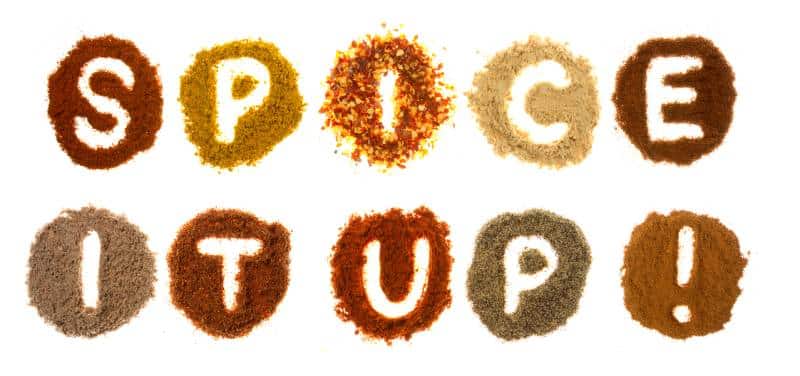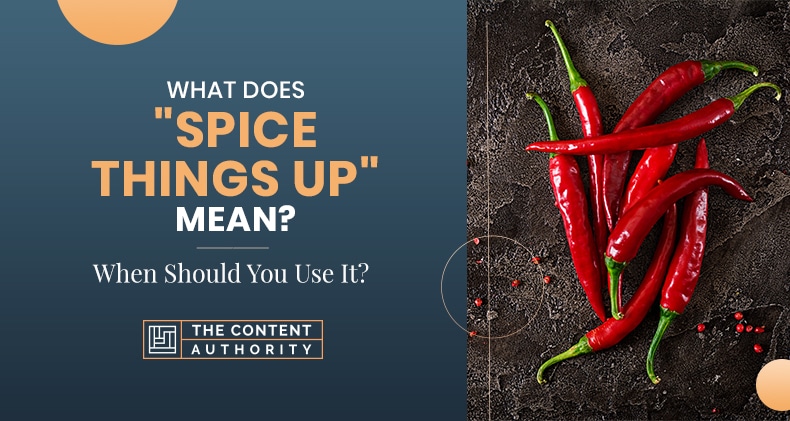The term “spice things up” can be used in different contexts, whether used literally or not. It is probably a phrase you’ve heard before or commonly use. It is easy to add to daily expressions and will surely “spice up” your vocabulary.
To “spice things up” means to make something more fascinating, thrilling, or interesting. When you are elevating the flavor of food by adding something extra, you are “spicing it up”. It can be used literally or figuratively.
This phrase can be adapted depending on the message you are trying to communicate. If you are adding herbs or spices to a meal, you can certainly “spice things up” by giving it more flavor. You can also refer to making a situation or environment more exotic, sexy, or extravagant.
Origin Of The Phrase

The exact origin of this expression is unknown, but we can find some associations within the beginning of spices. And how civilizations have used herbs for centuries.
The Origin Of Spices
We can describe a spice as a substance added to food or drink to intensify the flavor. This ingredient is usually aromatic and robust to the taste – sometimes hot. Many spices were well known to have medicinal or alchemical properties. Early pharmacists acknowledged these four types of spices: nutmeg, cinnamon, clove, and saffron.
- In late Latin, the word spice originated as species (plural), meaning “spices, goods, wares.”
- In classical Latin, the meaning was “kind, sort.”
- In Old French, the word was written as “espice,” whereas the modern version modified it to épice.
Based on these facts, we can deduce its literal meaning might have evolved from the start of the usage of spices in ancient times. Due to the nature of herbs, the figurative sense of the phrase “spice things up” later emerged.
The additional meaning of the phrase refers to making something more attractive and making it more enjoyable by varying or diversifying it. Historians believe this meaning originated around the 1520s.
How People Use The Phrase

To “spice things up” is frequently used as a phrasal verb with “spice” as the verb. Let’s say you want to add excitement to a lecture, story, or presentation; you can “spice things up” by doing so.
People also use the phrase in its literal meaning of adding spices or herbs to a meal or drink. We will separate each phrase’s usage below to understand their particularity better.
Literal meaning
The most frequent usage of this phrase is to describe when you want to add some flavor or “hotness” into food or drink. As mentioned earlier, spices are usually fragrant substances with a pungent taste. People use spices all over the world to add flavor and excitement to a plate.
You can easily “spice it up” in the kitchen, for example, by adding a pinch of paprika to your meat. You could spice up your drink by adding some cinnamon to your favorite cocktail.
Spicing things up, in this case, would mean that you are adding some extra taste to whatever it is you are boosting. When you add spice to a meal, you can make it more memorable, engaging, and hot.
Examples Of The Literal Meaning

- Some red chilis will spice up this shrimp pasta.
- That’s a great way to spice up the bland tuna.
- You can spice things up with cans of chipotle chiles that cost about 50 cents each.
- To spice up a primary dressing, try adding ground cumin, caraway seeds, or paprika.
- Gravy mix, barbecue paste, or a cheese sauce are a great idea to spice up cakes for your friends’ gatherings.
- A rich, red relish is sure to spice up almost anything.
- What other ingredients do you need to spice up the dishes for tonight’s event?
- Olivia decided to bring her homemade seasoning to add to her plate. The food here is so tasteless.
- My husband is great at spicing up recipes with his many tricks in the kitchen.
- The chef is known for using cardamom in his signature dish.
- Choose spices, pepper sauces, and hot sauce to spice up your meals.
- ‘Pikliz’ is a special Haitian topping used to spice things up with almost any meal.
- Add some hot banana peppers to the mix to spice up the original pickle brine a bit more.
- You can also spice your meal up with a serving of warm sake, chilled beer, or wine.
- At the table, you’ll find several different sauces with which to spice up your burger.
- Try spicing up your chicken with some salt, pepper, and cayenne pepper.
- He wanted a little more pepper to spice up his steak leftovers.
- Flavour seafood rice with a generous sprinkling.
- It would help if you spiced up tomato or cream sauces for fish and chicken.
- Some other ways salsa can spice up a dish is to top it on a baked potato or macaroni and cheese.
- Why don’t you spice up the mushroom and onion sauce? I think it could be more flavorful.
Figurative Meaning
The phrase “spice things up” is also trendy in its figurative sense, meaning that it departs from a literal use of words.
When you try to make something more interesting, inviting, or more lively, you are trying to “spice it up.”
This meaning of adding some ‘zest’ to things besides food or drinks is also very commonly used. English speakers easily understand when you say this phrase.
Examples Of The Figurative Meaning
Questions Using The Phrase
- Why don’t we spice up the evening by inviting a belly dancer?
- Will there be any changes to spice things up?
- Why don’t we spice the road trip up a little with some games?
- Where’s Ashley to spice things up when you need her?
Negative Statements Using This Phrase
- Please hold back from spicing up your reports with such colorful language. Stick to the facts, if you don’t mind.
- Martha would spice up her speech with a few rude jokes.
- I think like a manager. It would help if you spice things up a bit.
- The invasion of young Republicans, especially from Texas, may spice things up.
- Microsoft added guns, missiles, and various weapons to spice things up in Blood Wake.
- To add spice to the presidential debate, they disagreed about procedure and ideology.
Affirmative Statements Using This Phrase
- Her publisher wants her to spice up the stories by adding some sexual content.
- Spice up your life with this new tempting fragrance.
- My life lacks a sense of adventure. I need to spice things up.
- Free-spirited people can spice things up more quickly than others.
- Maybe it’s not too late for us to spice things up.
- Nothing like a bit of a spy story to spice this day up.
- This company needs people like Tom to spice meetings up.
- Different patterns and materials are spicing things up a bit this spring in the fashion world.
- I decided to spice these walls up a little bit, so I decided to paint my room differently.
- So she’s bringing some heart-warming family photos to spice things up.
- Whether you use it on your top or as an accessory, bright orange spices things up.
- Nelson is always looking for ways to spice up every party.
- That bluesy sound spices up Hargrove’s music.
- Therefore, when it says to be the salt in the world, it doesn’t mean you are the world. It means you are to go into the world and spice things up!
- When you are a bouncing brunette with a desire to spice things up, blonde is the answer for you.
Examples In Married Life
- When you have been married for a long time, you start finding creative ways to spice up your sex life.
- We are trying to spice up the relationship with some hot salsa dancing!
- I am somewhat tired of the good old missionary position. Let’s spice things up tonight.
- Let’s spice things up tonight. I want to go to a restaurant we’ve never been to before.
- A little body art will spice things up.
- To spice up the lips just a little, use a red-colored lip gloss.
Related Phrases
- To give energy or to refresh
- Add some color to
- Give a boost to
- Add some zest to
- Electrify
- Galvanize
- Get going
- Stir up
- Ginger up
- Put some spark into
- Put some life into
- Put new life into
- Perk up
- Vitalize
- Revitalize
- Enliven
- Make more exciting
- Liven up
More English Expressions
Take Away
So, to “spice it up” not only means to add some flavor to food or drink; it also means to make a situation thrilling and exciting, to bring something new to it. There are many ways and scenarios to apply this well-known phrase.
The more things you do on a day different from each other, the more enjoyable your day will be. The more things that you do in life, the more variety you have in your life – the better your life is. Variety is the spice of life. We hope we have brought you some ideas to spice things up!
“The world’s insatiable appetite for spices sparked trade routes that now span the globe.” – BBC.
“Herbs are the friends of physicians and the praise of cooks” – Emperor Charlemagne (AD 743-814)
Shawn Manaher is the founder and CEO of The Content Authority. He’s one part content manager, one part writing ninja organizer, and two parts leader of top content creators. You don’t even want to know what he calls pancakes.

